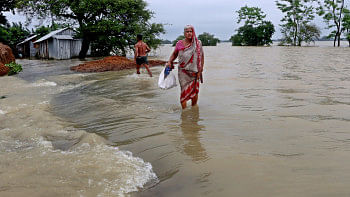Are we coasting on the 'highway to climate hell'?

According to Copernicus, the European Union's climate monitoring service, average global temperatures reached record highs for 12 consecutive months since June, 2023. The Director of Copernicus warned that unless planet-warming pollution caused by greenhouse gases is slashed, "This string of hottest months will be remembered as comparatively cold." The worse is yet to come, he said. Indeed, we are pummelled by the second round of blistering heatwaves across the globe that is threatening to leap to a whole new level.
This "shocking but not surprising news" has alarmed António Guterres, Secretary General of the United Nations, to the extent that in a bare-knuckled speech in New York timed for the World Environment Day (June 5), he compared humans to meteors that wiped out the dinosaurs. Moreover, he called the fossil fuel conglomerates the "godfathers of climate chaos."
In response to Guterres' fiery speech about the future of our planet, US congressman John Curtis, a Republican from Utah, sarcastically quipped, "I'd be curious to ask him how he got to work in the morning. How he gets around when he flies, because as far as I know, there aren't any electric planes." Then again, how does Mr Curtis commute from Salt Lake City to Washington DC? Certainly not by a stagecoach, bicycle, or walking!
As a self-proclaimed "better steward" of climate change and founder of the Conservative Climate Caucus in the US House of Representatives, Curtis thinks "false narratives" that equate fossil fuels with greenhouse gas emissions are duplicitous. He speaks for approximately 75 percent of Republicans who hold that the economy should be given priority, even at the risk of ignoring climate change. That is why the fossil fuel industry loves the Republicans and their like-minded hucksters worldwide so much that they donate millions of dollars to them for the sole purpose of rolling back environmental regulations.
Despite what climate change deniers believe, concentration of planet-warming carbon dioxide in the atmosphere is surging "faster than ever" to a level not seen for millions of years, the administrator of the National Oceanic and Atmospheric Administration said in a statement earlier this month. In May, the concentration hit an all-time high of nearly 427 parts per million.
A key measure of global warming is the difference between the amount of solar energy absorbed by the planet and the amount of thermal infrared radiation Earth emits back into space. A positive energy imbalance means the Earth is gaining energy, causing the planet to heat up. Due to greenhouse effect, this imbalance has doubled in the past 20 years, raising concerns about the large amount of heat the oceans are absorbing.
Presumably, that is why Guterres also said: "We need an exit ramp off the highway to climate hell." His reference to hell may have been metaphoric, though our closest neighbour and the brightest planet in the solar system, Venus, often called Earth's evil twin because it shares similarities with our planet in size, composition and gravity, became hellish billions of years ago.
How did Venus, once a pleasant planet, become an inferno? Without going into details, Venus' thick envelope of carbon dioxide, roughly 200,000 times the amount in Earth's atmosphere, gave rise to runaway greenhouse effect, a climatic phenomenon where the greenhouse effect became so intense that it spun out of control, resulting in unrestrainable and escalating increases in the planet's surface temperature. Today, the average surface temperature of Venus is 465 degrees Celsius, higher than that of a self-cleaning oven, and the atmospheric pressure is 90 times greater than on Earth.
Is it possible for the Earth to turn into a hothouse planet like Venus? Yes, it is almost certain that the Earth will become Venus-like in about two billion years, as the Sun increases in luminosity.
What is the likelihood of triggering a runaway greenhouse effect ourselves? That is a distinct possibility if we burn the entire "proven" reserve of fossil fuels, including shale oil and tar sands. The amount of carbon dioxide that will be released in the process could be enough to push the planet over the tipping points, which are critical thresholds that, if exceeded, will trigger devastating and irreversible changes in the surface temperature. This is a precursor to the onset of runaway greenhouse effect.
Part of what makes Earth "just right" is the interplay between carbon dioxide, water vapor and the planet's energy balance. If there is too much carbon dioxide and water vapor in the atmosphere, global warming will accelerate and energy imbalance will increase, causing more ocean evaporation and baking out of carbon dioxide from rocks and oceans. This added water vapor and carbon dioxide will intensify the greenhouse effect, driving temperatures a little higher. The higher temperatures will induce a positive feedback loop, intensifying the greenhouse effect even further. This self-sustaining process of intensification, most efficient in tropical ocean regions because large amounts of water vapor are pumped upwards by convective storms high in the atmosphere that, in turn, traps heat so effectively, will eventually snare the Earth into a vicious cycle of runaway greenhouse effect.
Against the ambivalence of China, Russia, the United States, and other countries equally committed to their fossil fuel industries, are we really coasting on Guterres' "highway to climate hell?" In a paper published last year in the journal Astronomy, scientists at the University of Geneva and France's CNRS laboratories in Paris and Bordeaux suggested that because of escalated global temperatures and the evaporation of water from seas and oceans, Earth could become an "uninhabitable hell" similar to Venus in just a few centuries, or even sooner.
Arguably, the general trend of catastrophic climate change we are witnessing currently is a bad omen for runaway greenhouse effect. Therefore, combating this threat to preserve Earth's climate stability and avert cataclysmic consequences requires urgent and collective efforts to stop the rapacious extraction and consumption of fossil fuels without further delay. However, world leaders and business magnates with stakes in the fossil fuel industry seem intent on continuing to gain morbidly vast wealth at the expense of every human and other creatures on our planet. Meanwhile, the average temperature will continue to rise, and millions of people will die as a result.
Finally, we cannot give our children and grandchildren the same number of years we had because we are all guilty to one extent or another for speeding on the "highway to climate hell." We are letting our jewel of a home be ruined by greed, stupidity and indifference. The Earth will still be here for a long, long time, spinning as a dead ball of rock.
Dr Quamrul Haider is professor emeritus at Fordham University in New York, USA.
Views expressed in this article are the author's own.
Follow The Daily Star Opinion on Facebook for the latest opinions, commentaries and analyses by experts and professionals. To contribute your article or letter to The Daily Star Opinion, see our guidelines for submission.

 For all latest news, follow The Daily Star's Google News channel.
For all latest news, follow The Daily Star's Google News channel. 











Comments